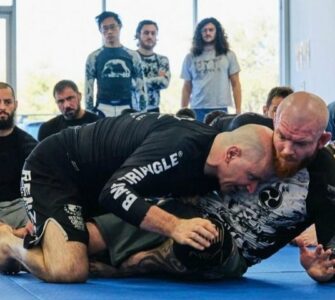Dopamine is a neurotransmitter in the brain that plays an important role in movement, emotion, and motivation. Dopamine is especially critical for athletes because it helps regulate key functions related to training, performance, and recovery.
When a Jiu-Jitsu athlete trains or competes, dopamine levels increase to promote focus, motivation, and energy. This “runner’s high” helps athletes push through difficult workouts and overcome mental barriers during competition. The spike in dopamine helps athletes perform at their peak by:
• Improving motor control and coordination. Higher dopamine levels enhance signaling between neurons that control movement. This can sharpen reaction time and coordination of complex movements.
• Boosting mental focus and attention. Dopamine helps filter out distractions so athletes can concentrate fully on the task at hand, whether that’s executing a complex routine or chasing down an opponent.
• Enhancing motivation and drive. Dopamine release activates the brain’s reward system, motivating athletes to keep training hard and pushing during competitions. This “drive” helps athletes persevere through difficult challenges.
After strenuous exercise, dopamine levels drop to promote rest and recovery. Lower dopamine allows athletes to relax, unwind and get a good night’s sleep. Proper recovery between training sessions and competitions is essential for athletes to improve performance over time.
If you practice jiu-jitsu, increasing your dopamine levels can help improve your performance and motivation. Here are some ways to boost dopamine as a jiu-jitsu athlete:
Exercise regularly. Exercise is one of the best ways to increase dopamine. When you train jiu-jitsu, lift weights, or do conditioning work, your body releases dopamine to help you push through fatigue. Aim for at least three jiu-jitsu sessions and two strength training workouts per week.
Cold shower.
Repeated cold exposure may enhance the brain’s dopamine response. In fact, one study found cold water at 14 degrees Celsius (57 degrees Fahrenheit) increased dopamine by 250%. The increase in dopamine production is greater than both tobacco and cocaine. Unlike cocaine, there is no sharp “rise” and “crash.” Cold plunges provide a sustained rise in dopamine over three hours. Increased dopamine was found to last in the body for up to six hours after an ice bath/cold shower.
Focus on interval training. High-intensity interval training (HIIT) workouts have been shown to stimulate more dopamine production than steady-state cardio. Do exercises like sprints, burpees, and squat jumps to boost your dopamine.
Lift heavy weights. Lifting weights with higher intensity can increase your dopamine for up to three hours after your workout. Focus on compound lifts like squats, deadlifts, and bench press.
Meditate daily. Studies show that meditation can increase dopamine levels over time. Start with 10 to 15 minutes of meditation per day to improve your focus, calmness and dopamine regulation.
Eat a protein-rich diet. Foods high in protein and amino acids, like eggs, nuts, and meat, help your body synthesize dopamine. Aim for 0.8 to 1 gram of protein per pound of body weight daily.
Get enough sleep. Sleep deprivation lowers dopamine levels, so aim for 7 to 9 hours of sleep per night to keep your dopamine optimized. This will also help your jiu-jitsu performance and recovery from workouts.
By incorporating these strategies, you can boost your motivation and performance on the mat through increased dopamine. Just make sure to implement them consistently to see long-term benefits.


















